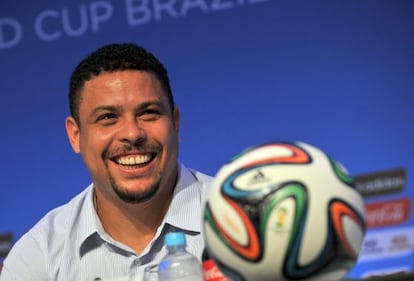“People have to realize that mixing the World Cup with protests is a mistake”
Brazil legend Ronaldo backs demonstrations but believes 2014 investment is sound

Ronaldo Luís Nazário de Lima, the former Cruzeiro, Real Madrid, PSV, Inter, Barcelona, AC Milan, Corinthians and Brazil striker, is today focused on matters other than thrashing the ball into the back of the net, as he did 352 times during an illustrious career that included two World Cups and two Ballons d'Or. In Prague to compete in a European Poker Tour event, sponsored by PokerStars, of which Ronaldo is ambassador — as is Rafa Nadal, who won the charity event at the expense of the Brazilian and the current world number one, Daniel Negreanu — "The Phenomenon" is also a member of the organizing committee for the Brazil World Cup. His aim, he says, is to become "a sports politician."
Question. Why an executive instead of a coach or pundit?
Answer. Because I love sport, I love soccer. This sector is still a little mistreated. My hope is to change things little by little, and I can only do this if I am politician for sport. Right now I'm leading the organization for the World Cup and I'm really enjoying it. To organize a World Cup in Brazil feels to me to be like scoring a goal in the final. Everything is very complicated, it a complex thing to organize.
Q. How did you view the social protests in Brazil during the Confederations Cup?
A. I viewed it very well. It was different to how it happened in Europe. In Brazil, we are in a very special moment; people are fed up with a huge amount of things; they are fed up with shortages, with the education, healthcare, security systems. Everything. People poured out into the streets before the Confederations Cup to complain about everything, absolutely everything. That goes straight to the politicians. They took advantage of a sports event of global interest to mix politics with sports a bit. There has been a lot of investment in the country for the World Cup, investments that will remain for the public. People have to realize that mixing the World Cup with the protests is a mistake. The investments that have been made, even if they aren't all connected to the World Cup, are an incredible achievement.
Q. Did you experience that scarcity and those problems in your youth?
A. Of course. I am completely in agreement with the people who complain about education, healthcare and security. Everything needs to be changed.
I wouldn’t change countries. I would have tried until the end to play for Brazil”
Q. Real Madrid revolves around Cristiano Ronaldo, who with Ribéry is up against Messi for the Ballon d'Or.
A. They are both phenomena. Two special people, each in their own way. They are very complete players. Messi has mastered a technique that for me was the most difficult: keeping the ball under such close control when running flat out... very few can do that. I managed to do it now and then, but Messi does it all the time. He always has the ball between his feet.
Q. "Unanimity is always stupid," [Brazilian writer] Nelson Rodrigues once wrote. Would you ever have considered switching national teams, like Diego Costa?
A. I was always clear that I wanted to play for my country. I'm sure he felt the same way but having not had any opportunities [to play for Brazil] maybe he changed his mind. That's soccer; a sport that even gives you the chance to choose another nationality in order to play. That's what makes sport so exhilarating, that you can be on two sides. I've had to play a few times against the team in my heart, Flamengo. You have to do it. But I wouldn't ever have changed countries. I would have tried until the end to play for Brazil.
Q. Do you think Brazil is favorite to win the World Cup?
A. Brazil and Spain for me are the favorites. Two incredible teams. Everything depends on how the players are at the end of the season. I can't see many defects in either side. Brazil, playing at home, with the crowd behind it, has a small advantage. Spain's players are going to have time to arrive in good shape. We'll see a very high level of soccer.
I fought a battle with my body. In the end I lost. It’s a fact of life”
Q. Do you miss it all?
A. At the poker table I get the adrenaline, the excitement I felt playing soccer. That substitutes it a little. But I miss games. But training, of course not!
Q. At this tournament you've played with Rafa Nadal, who also overcame knee problems like yourself.
A. We are special, and apart from that we are very dedicated to what we love doing. I loved soccer, it was my life, and I'm sure he feels the same way about tennis. All of our effort was because of that. It was a thing that became bigger than we could have thought. People need examples like that, of being able to overcome difficulty. We are those examples that people wanted. I did it because I what I wanted most was to play soccer. I didn't want to leave the game because of an injury. I fought a battle with my body. I won, but only briefly. In the end I lost. It's a fact of life.
Tu suscripción se está usando en otro dispositivo
¿Quieres añadir otro usuario a tu suscripción?
Si continúas leyendo en este dispositivo, no se podrá leer en el otro.
FlechaTu suscripción se está usando en otro dispositivo y solo puedes acceder a EL PAÍS desde un dispositivo a la vez.
Si quieres compartir tu cuenta, cambia tu suscripción a la modalidad Premium, así podrás añadir otro usuario. Cada uno accederá con su propia cuenta de email, lo que os permitirá personalizar vuestra experiencia en EL PAÍS.
¿Tienes una suscripción de empresa? Accede aquí para contratar más cuentas.
En el caso de no saber quién está usando tu cuenta, te recomendamos cambiar tu contraseña aquí.
Si decides continuar compartiendo tu cuenta, este mensaje se mostrará en tu dispositivo y en el de la otra persona que está usando tu cuenta de forma indefinida, afectando a tu experiencia de lectura. Puedes consultar aquí los términos y condiciones de la suscripción digital.









































